 |
Previous Issues |
| Cedar Mill Community Website |
|
| Search the Cedar Mill News: | About The Cedar Mill News |
|
|||||||
| Volume 8, Issue 11 | November 2010 |
||||||
|
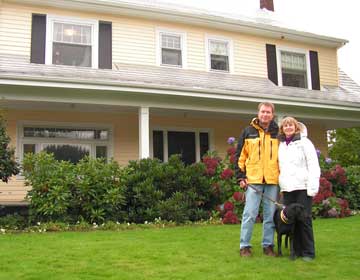 |
| Ed Blatter and Deby Barnhart in front of the house at the nursery. Ed grew up in the big old Dutch Colonial house on the property. His father Ted lived there from 1926 until he passed away in December 2008. An employee lives there now, but Ed and Deby have been thinking about turning it into a café once the current projects are completed. |
Ed's grandfather, William Emanuel Blatter, emigrated from Switzerland to attend Cornell University in New York, and eventually made his way to Cedar Mill and established a goat dairy on five acres of land with a lovely view of the Tualatin Valley, which he named Cornell Farm. Ed's father, Ted Blatter, was a well-known figure about town, doing tractor work for many local farmers and landowners, and raising strawberries on the farm. "He started growing a few horticultural crops for his friends," Ed says, "mostly rhododendrons, camellias, and forsythia. He had quite an interest in plants, and had been propagating some zonal geranium varieties in the basement. They were among the first plants we offered for sale."
Ed and a Cedar Mill friend of Ted's, Elroy Farah, sat down and drew up plans on a napkin for the original Patio Building and Ed got busy building it. They opened on Mothers' Day, 1987 with, "50 hanging fuchsia baskets, 200 geranium plants, and 50 cherry tomato plants in five-gallon pots with tomatoes on them." It was a hit, and Cornell Farm, the retail nursery, was born.
Deby and Ed learned the nursery business as they went along. "I kept a copy of the Sunset Western Garden Book at hand and I was constantly looking things up," says Deby. "We did a lot of our training 'in the trade,' going to classes and seminars offered by the Oregon Association of Nurserymen and Oregon and national commercial agriculture groups. People were very helpful to us."
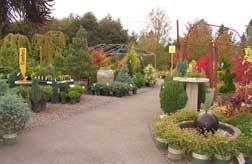 |
| Winding paths beckon Cornell Farm visitors to explore the many areas of the nursery |
The business expanded slowly but surely and is now one of the stars of the western retail nursery business. It's been in the "Revolutionary 100" innovative nurseries of America selected by Today's Garden Center magazine for several years, and was featured on the cover of the October 2008 issue. Deby attributes some of their success to their lack of traditional nursery experience. "We didn't know we were breaking rules, we just set things up the way we wanted to find them." They prefer to group plants according to their use in the garden, with sections including shade plants, shrubs, conifers, and a large greenhouse labeled Kitchen Gardens.
One of Deby's passions is container gardening. They carry a wide variety of containers that they bring in from all over the world. "We tried buying things in large quantities, by the shipping container, but it didn't work well, because if you make a mistake you're stuck with a lot of it." So they get smaller quantities of high-quality pottery that they know their customers will like.
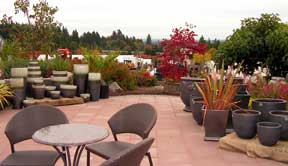 They offer "Garden Parties" for small groups to come in and plant up containers to take home. "We help them select the plants and teach them about the needs of the mix of plants in their containers. It's very important to us that our customers are successful in growing the plants we sell them. All of our staff are very knowledgeable, and are happy to answer questions about plant placement and care." They even offer an installation service to put your new plant in the ground if you need help.
They offer "Garden Parties" for small groups to come in and plant up containers to take home. "We help them select the plants and teach them about the needs of the mix of plants in their containers. It's very important to us that our customers are successful in growing the plants we sell them. All of our staff are very knowledgeable, and are happy to answer questions about plant placement and care." They even offer an installation service to put your new plant in the ground if you need help.
They work with landscape designers, but professionals are only about eight percent of their business. They have many loyal customers not only in the Portland area, but from as far away as Spokane and Seattle, who come to shop not just for plants but for their hard-to-find selections of pottery, garden furniture and gift items.
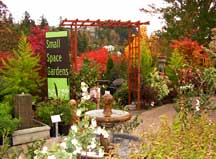 One of the things that sets Cornell Farm apart from other nurseries is the way they show the plants. There are many places in the nursery where plants are grouped something like the room arrangements in a furniture store, to give people ideas about plants that work well together. Deby says that she's been doing it this way a long time. "It just came to me intuitively, I guess. I started off by grouping annuals by color. The merchandising that we do has evolved over the years, and we organize these vignettes around plants with similar needs so you can reproduce the effect successfully in your own garden." Around each of the vignettes are plenty of each type of plant so people can select them easily to reproduce at home.
One of the things that sets Cornell Farm apart from other nurseries is the way they show the plants. There are many places in the nursery where plants are grouped something like the room arrangements in a furniture store, to give people ideas about plants that work well together. Deby says that she's been doing it this way a long time. "It just came to me intuitively, I guess. I started off by grouping annuals by color. The merchandising that we do has evolved over the years, and we organize these vignettes around plants with similar needs so you can reproduce the effect successfully in your own garden." Around each of the vignettes are plenty of each type of plant so people can select them easily to reproduce at home.
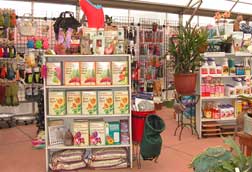 |
| Lots of organic-friendly supplements and remedies are available in the store |
Cornell Farm is also proud of their sustainability initiatives. "We try to educate our customers to minimize the amount of fertilizers and chemicals they use. We always try to steer people to the least harmful alternatives. Some of our customers in Forest Heights have had problems because their uphill neighbors are using those chemical lawn services, and they have to deal with the runoff. It makes people more aware of the effects of chemical fertilizers."
They employ Integrated Pest Management (IPM) practices at the nursery, which includes monitoring things closely, using beneficial insects and other biological controls, and selecting plants that do well in our climate.
"We recycle everything we can, including plastic pots, wood and metal. And we compost plant material here onsite," she says. They also work with their suppliers to minimize packaging and try to source their products as locally as is practical.
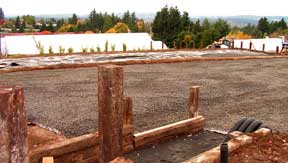 |
| Newly-terraced areas will accomodate increased retail display and growing spaces. |
They're in the middle of a major expansion of both retail space and growing area. Their downhill neighbor, Regency Park Assisted Living, decided to expand their parking area, and the contractor offered them 5000 cubic yards of soil that was going to be excavated. "We're on a hill, so any expansion needs to be terraced. This just seemed like too good an opportunity to pass up," says Deby. The Regency Park excavation hit the lava tube that underlies the area (the same one that caused problems when St. Vincent's was built) and so there's been quite a bit of blasting and smashing going on but it's nearly done.
Cornell Farm has added two new greenhouses, and will add at least two more, along with terraced retail space below the current Kitchen Garden. They grow the majority of their own plants on the site. Some are done with cuttings or from saved seeds, and they also get tiny starts from suppliers and grow them until they're big enough to sell.
In addition to providing beautiful plants and gardening advice, the store carries a wide variety of garden art, from statuary to unique trellises made from recycled garden tools and fencing, to seasonal decorations to spice up both outdoor and indoor spaces. "Ed and I enjoy traveling, and everywhere we go we're looking out for new products and merchandising ideas," says Deby. They go to industry shows and events and keep up on the latest plants and ideas through their suppliers as well.
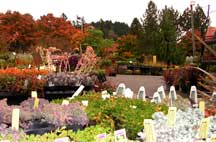 |
| Many sedum varieties are included in the ground cover section |
When they were getting started, Ed was in charge of production—growing plants in their greenhouses and outdoor production areas. He built most of the structures and installed irrigation, and developed fertilizing and growing regimens. With the growth of the business, long time employee Maureen Welsch was promoted to manage production so Ed could devote more time to financial management, sales trends and ordering to maintain profitability.
Ed and Deby have three children: daughter Berkeley, who has taken over as merchandising manager for the business; son Zoe, currently a Product Design student at UO, who handles all their Information Technology issues including the new version of their website and all their print materials; and their youngest daughter Ranann, a junior at OSU in the pre-veterinary program who is currently doing her "large animal" work in Botswana.
D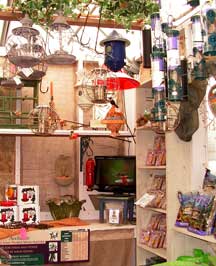 eby says that this recession hasn't affected their business as much as it has Oregon's wholesale nursery business. "The housing downturn has really been devastating for some of the wholesale plant nurseries. But it seems that our customers are turning their attention to improving their gardens, and so we haven't really been hurt so much. We are paying more attention to value, and not carrying so many high-priced items, but in general we're doing fine. We've also been pretty good at adapting to the unusual weather conditions. We've had two years in a row with 50-year weather records—wet, cold, dry, you name it. But we've managed to stay ahead of that." She credits Ed's attention to analyzing sales patterns and data with at least part of that success.
eby says that this recession hasn't affected their business as much as it has Oregon's wholesale nursery business. "The housing downturn has really been devastating for some of the wholesale plant nurseries. But it seems that our customers are turning their attention to improving their gardens, and so we haven't really been hurt so much. We are paying more attention to value, and not carrying so many high-priced items, but in general we're doing fine. We've also been pretty good at adapting to the unusual weather conditions. We've had two years in a row with 50-year weather records—wet, cold, dry, you name it. But we've managed to stay ahead of that." She credits Ed's attention to analyzing sales patterns and data with at least part of that success.
They love the community feeling both in Cedar Mill and in their nearby neighborhood, with Catlin Gabel and Oregon College of Art & Craft across the street. "We're between the hospital and the cemetery, which doesn't hurt either," she says. "I'm kind of a psychologist," she adds. "Plants have a way of healing people. We are still really loving what we do after all these years! And it's also about respecting this land that's been in the family for three generations, and keeping it healthy and productive."
Cornell Farms is located at 8212 NW Barnes Rd. Winter hours are 9 am – 5 pm daily. Visit their website at cornellfarms.com, and follow them on their Facebook page. Phone them at 503-292-9895 or email them at info@cornellfarms.com.
Published monthly by Pioneer Marketing & Design
Publisher/Editor:Virginia Bruce
503-803-1813
PO Box 91061
Portland, Oregon 97291